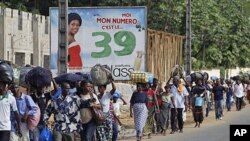In the past week, fighting in Ivory Coast between two political factons has expanded -- causing more Ivorians to flee their homes and exacerbating the country's economic crisis. Financial sanctions have been imposed on Ivory Coast to pressure incumbent President Laurent Gbagbo to step down. But in the short term, though Mr. Gbagbo continues to cling to power, the humanitarian situation is worsening, and ordinary citizens are feeling the financial pinch.
"We’re actually seeing a dramatic worsening of the situation," said Amnesty International’s Scott Edwards, who is sounding the alarm after the most recent fighting in Ivory Coast caused thousands more to flee the West African nation. "Over the past week, we’ve seen tens of thousands of people displaced internally. We’ve seen a huge uptake of refugees fleeing to Liberia, to Ghana as well. Unfortunately we are also seeing an increase in the armed conflict," Edwards said.
At the gates of Saint Ambroise Church in Abidjan, the country's commercial capital, volunteers gather to greet men, women and children who’ve been fleeing the violence. "At the moment we actually have two types of people. Those who come and spend a day or two in the hope of continuing their journey and those who stay two or three days," said Ange Desire Heliasson, the head of the parish.
Many delegations of African leaders have come and gone through Ivory Coast - trying to persuade Mr. Gbagbo to step down, after the United Nations certified he had lost last November’s elections to rival Alassane Ouattara. But nothing has worked so far. Meanwhile, international and regional sanctions against Mr. Gbagbo are driving down the Ivorian economy. Ebuaka Souleman, a beauty salon owner, says since the crisis began, it has been a real struggle. "Right now we cannot even get half of what we were getting then, we are not working and there are no clients," Souleman said.
Souleman's employees have also had to go for weeks without pay. "It’s now two months that we’ve been working and have not been paid," said Kouadio Amo Desire, a beautician in the salon.
This week, long queues of government workers also lined up outside the few open banks in Abidjan hoping to cash their latest paychecks.
Some Ivorians, in fact, say they are just tired of the prolonged crisis. "We are really weary of what is going on," one man said.
While ordinary Ivorians are obviously feeling the pinch, Todd Moss of the Center for Global Development says Mr. Gbagbo must be too.
"He has a very large bill to pay every month to keep the army and security forces and the civil service on his side. That means he is going to need access to cash," Moss said.
But when you are desperate, Moss says, you can still find ways to extract money. "So he still has his allies controlling the ports; he's still maybe able to squeeze companies that are under the scrutinies of the West to be able to get some cash out. He runs what's like a parallel illegal tax regime by using road blocks and other means to get cash out of the economy that he can use to fund security forces. I think what's dangerous right now is when we've seen groups like the young patriots and some of the militias showing brutal violence against civilians and they are being paid through those ressources." Moss said.
Nevertheless, Moss says, the financial sanctions are the right approach despite their short-term effects on ordinary citizens. Eventually, he says, the financial pressure will continue to isolate Mr. Gbagbo more and more.
Ordinary Ivorians Feel Pinch of Sanctions Aimed at Incumbent President




